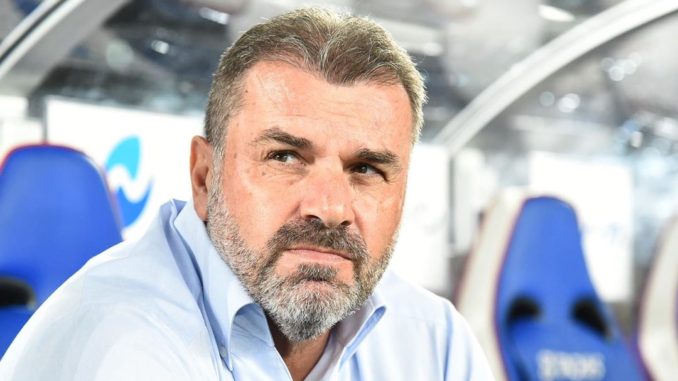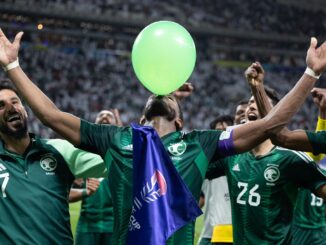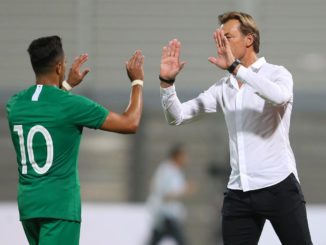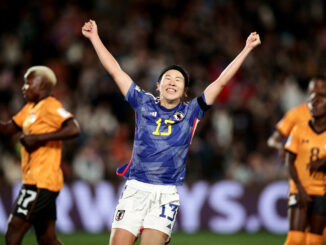
When you appoint Ange Postecoglou, you know what you’re getting.
I’m not talking about the style of play, the swashbuckling, free flowing, fluid attacking football. You get that, but more than that you get something bigger, something more important – success.
Postecoglou is a winner. Wherever he has gone in his career, whether that be South Melbourne in the NSL, Brisbane Roar in the A-League, or the Socceroos, Postecoglou wins.
And now, barring a calamity against FC Tokyo on Saturday afternoon in front of a near sold out (and potentially record) crowd at the Nissan Stadium, he will bring success to Yokohama F.Marinos for the first time in 15 years and less than 24 months before be began his latest “project” in Japan’s second biggest city.
Postecoglou is nothing if not a man confident in his own ability, and speaking to The Asian Game podcast on the eve of his debut season in 2018 he was bullish about his own personal record.
“I don’t talk about winning but my whole career has been based on that,” he said.
“Whether that was in the NSL, the A-League or at international level, all I’ve ever done is win things and that’s what I’m hear to do.”
But for the former Socceroos manager, it’s not just about winning. It’s about playing a certain style, with winning being the inevitable consequence of that style.
“I’ve obviously got my own sort of beliefs and philosophy about how the game should be played and how I want my teams to play,” he continued.
Speaking with sports radio station SEN in November, he elaborated on this point.
“I just want my teams to play this kind of football and I’ve had a really strong conviction. Now obviously you have to be successful, because if you’re not successful you wont last in the game, and I’ve always had success. But I’ve always had success as a consequence of doing the stuff I believe and the stuff I am passionate about.”
His project at Yokohama hasn’t always been smooth sailing, but while last season they battled with wild inconsistency, they showed in a number of scintillating performances that if they could iron out a few kinks, that they were onto something special.
Who could forget the 8-2 win over Vegalta Sendai in their first match after the break for the World Cup? The fact they followed that up with a 5-2 loss to FC Tokyo a week later, however, perfectly illustrated why they were stuck in a relegation battle last season.
As brilliant as they were, they were also brilliantly inconsistent.
That thumping win over Sendai was followed up with five losses from their next six games. As outstanding as they were in attack, with the second highest number of goals scored, they were equally as poor defensively, keeping only six clean sheets all season and conceding 56 goals.
No matter how good you are in attack, you will achieve nothing with a defence that porous.
But through it all Postecoglou never wavered from his belief. Whereas other managers would’ve altered their tactics, fearful of the drop or losing their job, Postecoglou’s stubborn belief in his philosophy meant there was only going to be one way.
And even during last season, the cornerstones of this season’s success were already being laid. Australia defender Milos Degenek, who Postecoglou had worked with with the Socceroos, left the club mid-season and was replaced by Brazilian Thiago Martins.
The 24-year-old has been a rock at the back for Yokohama, and earlier this year spoke to The Asian Game podcast about his move to Japan and working with Postecoglou.
“His style of play is different from what I am used to in Brazil,” he admitted.
“He likes an offensive way of playing, but also with a compact defensive line, always pressing. He’s a guy that is always motivating us and always helping us on the pitch.”
The off-season represented a chance for Postecoglou to do what he does best, further mould the squad into his image, and out went a host of stars including the legendary defender Yuji ‘Bomber’ Nakazawa, as well as the likes of Ryosuke Yamanaka, Sho Ito and Hugo Vieira, while regular goalkeeper Hiroki Iikura left for Vissel Kobe earlier this season.
In came the likes of Marcos Junior, Edigar Junio, Theerathon Bunmathan, Rikuto Hirose and Park Il-gyu, and all have made a significant contribution to the success of F.Marinos this season.
“Certainly at the start of the year we were definitely unfancied,” Postecoglou told radio station SEN.
“We did a lot of work last year in terms of changing the way we play. We struggled for consistency last year, we were very up and down as a team.
“We got to the (Levain) Cup final and at the end of the year the club, and everyone involved at the club, said we really want to continue down this road of playing this kind of football.
“We had to get the recruiting right, and we did, we bought in probably six or seven new players. And right from the first day of pre-season you could see that the players returning from last year were a different breed, they had more confidence and belief in what we were doing.
“And the new players coming in we cherry picked, but believed could play the sort of football I wanted to. And it’s grown from there.”
But again it hasn’t been without its problems.
Edigar Junio was in scintillating form to start the season, with 11 goals in 16 games, before being struck down with an ankle injury that has sidelined him for the remainder of the season.
Losing a player of that quality, who had struck up such a deadly partnership with countryman Marcos Junior, was always going to be a blow. Between them the Brazilians had scored 20 of Yokohama’s 35 goals to that point of the season.
It took another month for his replacement, Erik, to arrive but it was a largely seamless transition, with the Brazilian playing a key role in the back half of the season with seven goals in his 11 appearances.
But it’s his form in the final month of the season that has made all the difference. With the title in sight, five of his goals have come in the last four games, including a brace against Kawasaki Frontale last weekend.
Those kinks that needed ironing out last season are now largely gone. They still leak more goals than the other top seven sides, but that has tightened up considerably – from 56 goals last season to 38 this year.
“We’ve had some ups and downs along the way,” Postecoglou said. “But nowhere near as bad as last year. And the last two months, it’s really the players driving it now, they’re really enjoying our football, we’re scoring goals and there’s a real belief.”
Those familiar with Postecoglou’s work know the journey can be long, but once you reach the destination, when it all clicks, it’s not only a sight to behold, it’s also an unstoppable force.
That is Yokohama in the final few months of the season. Undefeated since mid-August, nine wins from their last 10 games, with 28 goals scored and just eight conceded, and only once have they conceded more than one goal, that being in a 4-2 win over Consadole Sapporo a month ago.
This is “Ange-ball” at its finest.
Japan and Postecoglou always seemed like a match made in heaven – with his admiration of their advanced football culture, when compared with Australia at least, and Japan with its admiration of the type of attacking football that Postecoglou demands.
“The trick here (Japan) was I kind of knew this football works, but how could I go into a new country where culturally they’re very different, it’s a very conservative nation, they play their sport conservatively and that’s the antithesis of what I’m trying to create,” he said.
“So how do I get a group of people, when I don’t even speak the language, to believe in something beyond saying we’re going to win the Championship. That’s the bit I’ve really enjoyed.
“There’s a real appreciation for what we’re doing, within the club the players are loving playing like we are, the supporters are loving it, but also other clubs here in the J.League, (and) people following football, are really enjoying it and for me that’s the greatest satisfaction.”
Some now want to take the marriage between Postecoglou and Japan even further, with leading media figures even suggesting he should take over as coach of the Samurai Blue. It’s a tantalising prospect given the talent he would have at his disposal, although one that is unlikely to ever happen.
But those in Yokohama will certainly be hoping he doesn’t go anywhere. The fans adore him – every week there are banners all across the stadium featuring the grizzled face of Postecoglou – and with the AFC Champions League next year, the prospect of continental glory is one that would strongly appeal to Postecoglou, especially after his only previous campaign was an underwhelming one with Brisbane Roar.
But while those in Yokohama will be desperate to keep him, they will also know that Postecoglou is eternally restless. While he has signed a one-year extension, keeping him beyond that may be a struggle. He will be itching for the next challenge, the next project.
But that is for the future, for now they can just appreciate what they have – the ultimate winner.
Photo: IG/yokohamafmarinos
Listen to Episode 47 of The Asian Game as Sean Carroll talks about Ange Postecoglou and Yokohama F.Marinos.
Listen to Ange Postecoglou talk to Scott McIntyre on the eve of the 2018 J.League season on Episode 14 of The Asian Game podcast.
Listen to Thiago Martins on Episode 32 of The Asian Game podcast talk about his move to Yokohama F.Marinos




